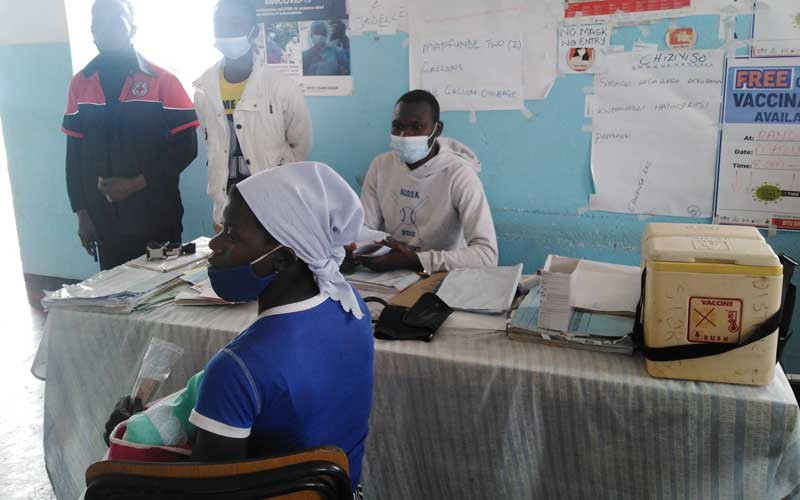
PATRICIA Kadzire (not her real name) arrives at the local clinic carrying a small bag of grain millet on her head.
Kadzire, an expecting mother, is accompanied by her sister and aunt lest she encounters danger on her way to Chiwenga Clinic, which is several kilometres from their village in Mudzimu.
She intends to barter trade her millet to register for antenatal care services.
Resorting to the age-old barter trade is helping hundreds of villagers, especially expecting mothers, who cannot afford paying cash or are uninsured at local clinics in most parts of Muzarabani district.
While it is government policy to provide free maternal health services, most public health facilities across the country are charging a “nominal fee” to keep them going.
Given the country’s general poor economic performance coupled by the ailing agro-industry, healthcare facilities in Muzarabani have turned to barter trade as a stop-gap measure for the down-trodden villagers.
Although historically barter trade was common among villagers, it was unusual for government services to be paid with grain, chickens or goats, among others.
“Some of us don’t have the money that the clinic might require, so they ask us to bring grain in order to register for antenatal care,” Kadzire said.
- Mothers trade grain for maternal care
- Illegal miners destroy Mavuradonha sanctuary
- Army deployed at Muzarabani oil project
- Invictus identifies more gas deposits
Keep Reading
“I think that way; it makes medical services affordable for most of us because in these communities, the currencies in circulation are the United States dollars and the Mozambican metical.”
Chiwenga ward is on the fringes of Zimbabwe’s border with Mozambique and the clinic also serves a number of patients from across Tete province in the neighbouring country.
According to a poster on the walls of the clinic, one can get medical assistance after parting away with a gallon of sorghum/millet or two gallons of maize.
The clinic’s sister-in-charge Vimbai Muguti confirmed to NewsDay that they were bartering because most villagers were struggling to get cash.
“We realised most of our patients have grain and do not have cash, so we ask them to bring grain,” she said.
“We collect the grain and resell it in bulk. The money is used for the day-to-day running of the clinic.”
Chiwenga health centre committee chairperson Israel Mutombo said the idea of bartering was meant to cushion both sides — the patient and the health centre.
“It was the idea of the committee after realising that things were not looking good and we wanted to keep our institution going,” Mutombo said.
“Our clinic faces a number of challenges ranging from furniture to resource constraints due to the big catchment area that it serves.
“The maternity part of the clinic does not have adequate equipment and some expecting mothers are forced to sleep on the floor.
“Some expecting mothers would die at home or they sold their livestock for a song to raise that nominal fee charged by the clinic and we decided to barter to cushion them.”
Many expecting mothers are now seeking antenatal help at the clinic ever since the introduction of bartering.
“We have had cases of mothers failing to come to the clinic for maternal care services just because of this fee,” Mutombo said.
However, the health centre, which caters for close to 7 795 people in Muzarabani’s wards 23 and 24, as well as parts of Tete province in Mozambique, faces a number of challenges.
“Our catchment area is too big for such a small health centre and this strain the resources we have. We also need an ambulance to ferry expecting mothers with complications to the referral hospital at St Albert’s, a hundred kilometres away,” Mutombo said.
Muzarabani North legislator Zhemu Soda said efforts were being made to decongest the health centres by setting up health posts across all wards.
“Our clinics are few and people have to walk long distances, so as government, we are building what we call health posts in the wards. For instance in Kairezi ward, we have a health post that is almost complete,” Soda said.
“The idea to decentralise health service is meant to ease pressure on the few clinics that we have in the constituency. The other problem is that Muzarabani does not have a district hospital and very sick patients are referred to St Albert’s, which is owned by missionaries. We are contemplating building a district hospital at Muzarabani centre to cater for referred patients from this part of the district,” he added.
Community Working Group on Health executive director Itai Rusike said the policy of free public sector healthcare at rural clinics was still in force.
“Pregnant women, children under five years and adults over 65 years are also fee-exempt up to district level,” Rusike said.
“Poor people have, thus, faced a variety of de facto cost barriers such as transport costs, private purchases of medicines due to drug stock-outs and non-functioning exemption schemes.
“Barter trade for health care using grain will create serious logistical challenges to the health facilities and the communities in terms of costing, storage and accountability.
“The advent of the new Constitution means that the government of Zimbabwe, as the guarantor, must commit to health as a human right and mobilise domestic resources to fund a health benefit that is accessible to all.”
Rusike also pointed out that there has been a shift in the region towards abolition of user fees, with evidence that this was proving more successful when accompanied by increased investment in primary and district level services.
Defence and War Veterans Affairs minister Oppah Muchinguri-Kashiri bemoaned the obsolete equipment and furniture at Chiwenga Clinic.
“Please Honourable MP [Soda], you need to mobilise resources, especially furniture and equipment for this clinic because what I saw in the maternity ward is not pleasing at all,” she said.
According to the Multiple Indicator Cluster Survey of 2019, Zimbabwe has a maternal mortality ration of 462 deaths per 100,000 live births, and a neonatal mortality rate of 32 deaths per 1000 live births.
While this is an improvement from the 614/100 000 live births for maternal deaths recorded in 2014, the slow rate of improvement indicate that Zimbabwe is unlikely to meet the SDG target for reducing maternal mortality.











